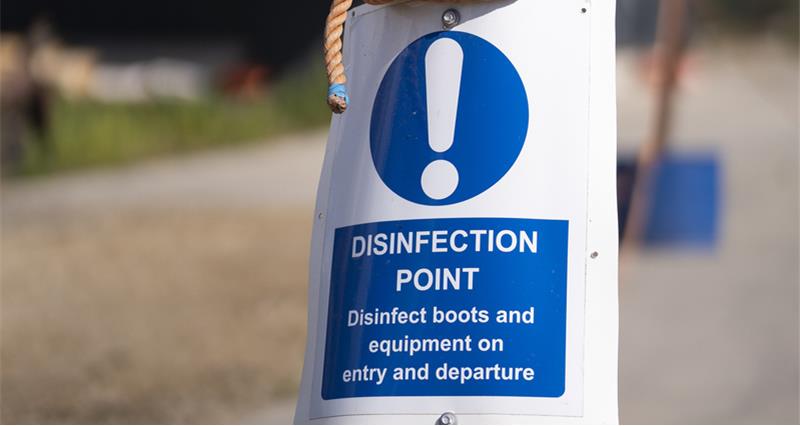The examines whether Defra, working with key public and private bodies, is taking effective action to ensure England is resilient to animal diseases.
It says:��
- Outbreaks of animal diseases have occurred in each of the past six years and Defra and the APHA have worked hard to manage them.
- It’s likely that Defra and APHA would struggle to cope with a more severe outbreak of animal disease.
- Long-term resilience is being undermined by the necessity of focusing on increasingly frequent outbreaks and there is no long-term strategy.
“We cannot afford another disease outbreak, not when we’re already struggling to fight diseases already here such as bovine TB, Bluetongue and Avian Influenza.”
NFU President Tom Bradshaw
Government lacks strategy and action plan
Key public bodies are insufficiently prepared for a major animal disease outbreak and would likely struggle to cope with one, the latest report from the NAO (National Audit Office) finds.
Factors such as climate change and antimicrobial resistance mean outbreaks are increasingly frequent and livestock more vulnerable, but the government lacks a strategy and action plan for improving resilience to animal diseases.��
Past animal disease outbreaks have had significant economic impacts. For example, the major foot and mouth disease outbreak of 2001 cost the public and private sectors an estimated £13.8 billion (in 2023-24 prices). Recent outbreaks of highly pathogenic bird flu have resulted in 7.2 million birds being culled between November 2020 and mid-March 2025.
Defra and APHA have worked hard to manage recent medium-severity outbreaks, but the report finds a range of challenges leading to them being insufficiently prepared for a more severe outbreak.
These include:
- Significant gaps in government contingency plans.
- Outdated and inefficient operational processes within APHA.
- Out-of-date infrastructure, particularly relating to the government’s animal science facility at Weybridge. Defra’s programme to redevelop Weybridge is now on track but will not be completed for another 10 years.
- No comprehensive livestock movement tracing system, despite attempts to establish one beginning in 2013.
- Capacity and skills shortages – for example, the APHA’s vet vacancy rate in April 2025 was 20%.
Constant outbreak mode
Defra and APHA have introduced initiatives to strengthen resilience, such as the Animal Health and Welfare Pathway, which provides funding to support improvements in animal health on farms, and research and innovation to improve detection and response to disease.
However, progress is being undermined by global issues with supply of animal vaccines and significant threats to biosecurity at the border.
Defra’s best estimate for the proportion of live animal imports from the EU and the rest of the world currently undergoing physical checks is 5%, against a government target of 100% at border control posts by the end of 2024.
Defra and APHA have a good understanding of new and emerging risks from animal diseases, a core principle of resilience. They have robust arrangements in place to gather intelligence on animal disease risks through ‘horizon scanning’ and international disease monitoring. APHA also conducts surveillance, testing and inspections of premises to help detect infections early and stop their spread.
��
But, the report says, responding to increasingly frequent outbreaks has affected Defra’s and APHA’s ability to undertake other important work that would help strengthen resilience in the longer term. Their current approach, where staff switch priority from business-as-usual activities to outbreak response, is unlikely to be fit for purpose if they are in almost constant outbreak mode.
Must invest in biosecurity
Responding to the report's publication, NFU President Tom Bradshaw said: “These are very worrying findings from the NAO. It’s something we’ve been warning ministers about for months, and we support the NAO’s recommendations.
��
“We’ve seen how disease can bring this country to a standstill. We saw it in 2001 and 2007 with foot-and-mouth disease – a disease which still haunts the memories of so many in our sector and has been prevalent in countries across Europe this year. We cannot afford another disease outbreak, not when we’re already struggling to fight diseases already here such as bovine TB, Bluetongue and Avian Influenza.
��
“We have to invest in biosecurity, skilled staff resource and IT infrastructure now to avoid an unmanageable situation in the future. I hope the Chancellor thoroughly considers the implications of this report ahead of her Spending Review next week and sets out a comprehensive and fully funded biosecurity, disease control and resilience strategic plan to help minimise the risks to British farming, the food we produce, and our economy as much as possible.”
The National Audit Office scrutinises public spending for Parliament and is independent of government and the civil service. Through its work, it provides information to Parliament to hold the government to account.
It audits the financial accounts of departments and other public bodies, examining and reporting on the value for money of how public money has been spent.
.



